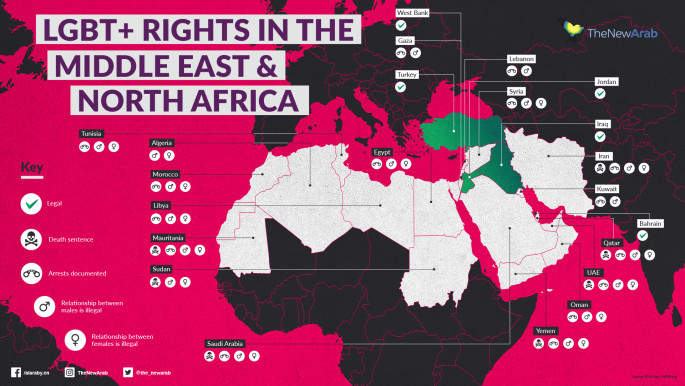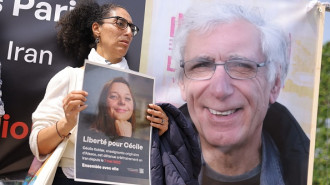'This is what God wanted': Top Egyptian actor reveals son is transgender
'This is what God wanted': Top Egyptian actor reveals son is transgender
Hesham Salim said he was not 'confused or surprised' when his son Nour came out as transgender.
3 min read
Egyptian transgender activist Malak al-Kashef called the revealation a 'remarkable step towards acceptance' [Getty]
A prominent Egyptian actor has won praise for breaking taboos by revealing his support for his transgender son's transition.
Hesham Selim spoke about his son's transition on Egyptian talk show "Al-Qahera Wal Nas" on Sunday.
"My daughter Noura is now my son Nour," the 62-year-old actor said according to Egyptian Streets. "This is what God wanted... I was not confused or surprised, because from the day she was born I could see her as a boy."
"As his father, I have to help him to be able to live the life that he wants," Selim was quoted as saying by Openly.
Selim explained that his son, who was assigned female at birth, began socially transitioning at 18-years-old. While Nour lives his life as a man, he has not been able to change his identification documents to reflect the transition, the actor added.
Nour is now undergoing the process of physical transition, Selim said. Also known as sex reassignment or medical transition, the physical transition process varies from person to person but can involve hormone therapy and surgery.
Selim's frank admission and his family's acceptance of his son's gender identity have won him praise on social media.
"This is a remarkable step and development for transgender people, and a step towards societal acceptance and a greater amount of support than exists now," outspoken Egyptian transgender activist Malak Al-Kashef wrote on her Facebook page.
Others condemned Selim and his son, claiming both their actions went against religion. The majority of Egyptians are Muslims and many are deeply conservative. Rights groups say ignorance around the LGBTQ+ community leads many to conflate being transgender with homosexuality.
Although sex reassignment and gender transition are not criminalised, transgender Egyptians face legal hurdles and fierce societal opposition.
The medical transition process is opaque and seemingly byzantine. It used to involve psychological treatment for two years and approvals by a committee including a Muslim cleric but has now been changed to give the final seal of approval to Islamic scholars at the Al-Azhar University, the Associated Press reported earlier this year.
Nazeer Ayad, secretary-general of Al-Azhar's Islamic Research Academy, told the AP that sex "change or correction" is only allowed in "exceptional cases", such as for people assigned intersex at birth. That tallies with information provided by LGBTQ+ rights organisation Bedaya.
It is unclear whether Selim's son sought approval for medical transition in Egypt or elsewhere.
While homosexuality is not criminalised, LGBTQ+ Egyptians are often prosecuted under vague morality laws and are not afforded legal protections against discrimination.
Cairo-based rights group Bedaya recorded 92 arrests of LGBTQ+ people during 2019, more than two thirds of which it said were random arrests off the street with "no legal basis... other than the individual discretion of the police officers".
In March, Human Rights Watch condemned Egypt for "refusing to recognise the existence of lesbian, gay, bisexual, and transgender people" and "flouting its responsibility to protect the rights of everyone".
Cairo rejected recommendations to end the arrests of LGBTQ+ Egyptians during its Universal Periodic Review, a process through which members of the United Nations Human Rights Council weigh in on states' human rights records.
Egypt said it did "not recognise the terms mentioned in this recommendation", namely sexual orientation and gender identity.
Follow us on Facebook, Twitter and Instagram to stay connected
Hesham Selim spoke about his son's transition on Egyptian talk show "Al-Qahera Wal Nas" on Sunday.
"My daughter Noura is now my son Nour," the 62-year-old actor said according to Egyptian Streets. "This is what God wanted... I was not confused or surprised, because from the day she was born I could see her as a boy."
"As his father, I have to help him to be able to live the life that he wants," Selim was quoted as saying by Openly.
Selim explained that his son, who was assigned female at birth, began socially transitioning at 18-years-old. While Nour lives his life as a man, he has not been able to change his identification documents to reflect the transition, the actor added.
Nour is now undergoing the process of physical transition, Selim said. Also known as sex reassignment or medical transition, the physical transition process varies from person to person but can involve hormone therapy and surgery.
Selim's frank admission and his family's acceptance of his son's gender identity have won him praise on social media.
"This is a remarkable step and development for transgender people, and a step towards societal acceptance and a greater amount of support than exists now," outspoken Egyptian transgender activist Malak Al-Kashef wrote on her Facebook page.
Others condemned Selim and his son, claiming both their actions went against religion. The majority of Egyptians are Muslims and many are deeply conservative. Rights groups say ignorance around the LGBTQ+ community leads many to conflate being transgender with homosexuality.
 |
| [Click to enlarge] |
Although sex reassignment and gender transition are not criminalised, transgender Egyptians face legal hurdles and fierce societal opposition.
The medical transition process is opaque and seemingly byzantine. It used to involve psychological treatment for two years and approvals by a committee including a Muslim cleric but has now been changed to give the final seal of approval to Islamic scholars at the Al-Azhar University, the Associated Press reported earlier this year.
Nazeer Ayad, secretary-general of Al-Azhar's Islamic Research Academy, told the AP that sex "change or correction" is only allowed in "exceptional cases", such as for people assigned intersex at birth. That tallies with information provided by LGBTQ+ rights organisation Bedaya.
It is unclear whether Selim's son sought approval for medical transition in Egypt or elsewhere.
While homosexuality is not criminalised, LGBTQ+ Egyptians are often prosecuted under vague morality laws and are not afforded legal protections against discrimination.
Cairo-based rights group Bedaya recorded 92 arrests of LGBTQ+ people during 2019, more than two thirds of which it said were random arrests off the street with "no legal basis... other than the individual discretion of the police officers".
In March, Human Rights Watch condemned Egypt for "refusing to recognise the existence of lesbian, gay, bisexual, and transgender people" and "flouting its responsibility to protect the rights of everyone".
Cairo rejected recommendations to end the arrests of LGBTQ+ Egyptians during its Universal Periodic Review, a process through which members of the United Nations Human Rights Council weigh in on states' human rights records.
Egypt said it did "not recognise the terms mentioned in this recommendation", namely sexual orientation and gender identity.
Follow us on Facebook, Twitter and Instagram to stay connected

![Palestinians mourned the victims of an Israeli strike on Deir al-Balah [Getty]](/sites/default/files/styles/image_684x385/public/2024-11/GettyImages-2182362043.jpg?h=199d8c1f&itok=xSHZFbmc)


![The law could be enforced against teachers without prior notice [Getty]](/sites/default/files/styles/image_684x385/public/2178740715.jpeg?h=a5f2f23a&itok=hnqrCS4x)
 Follow the Middle East's top stories in English at The New Arab on Google News
Follow the Middle East's top stories in English at The New Arab on Google News

![The law could be enforced against teachers without prior notice [Getty]](/sites/default/files/styles/image_330x185/public/2178740715.jpeg?h=a5f2f23a&itok=xMdFOAIF)
